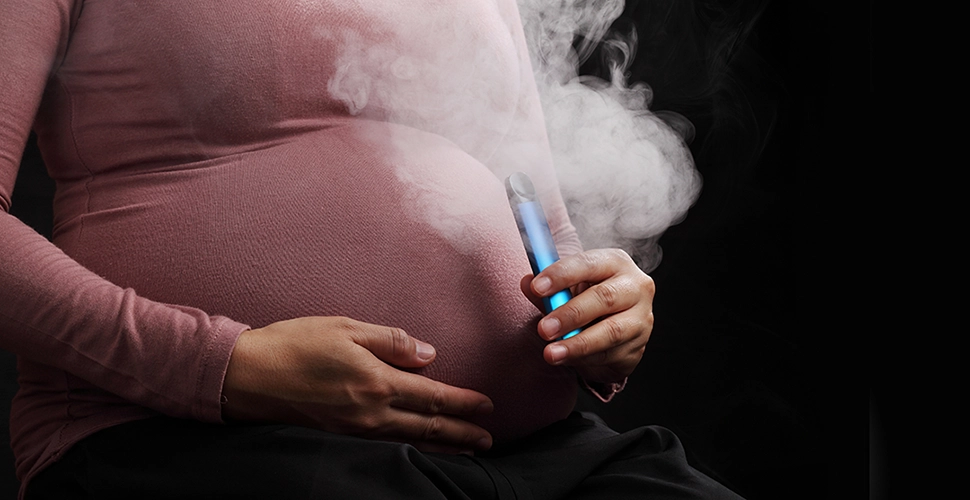Everyone knows the risks of smoking while pregnant, but what about the risks of vaping while pregnant?
As the prevalence of e-cigarette use among young adults increases, the likelihood of vaping among women of reproductive age also increases.
Studies show up to 7% of pregnant women use e-cigarettes. However, this is likely an underestimate given the stigma around using tobacco while pregnant and the inconsistent assessment of e-cigarette use in healthcare settings.
Is vaping bad while pregnant?
Currently, there is a widespread and incorrect belief that e-cigarettes are less harmful than smoking cigarettes during pregnancy. While e-cigarette vapor doesn’t have the 7,000 chemicals in cigarette smoke, e-cigarettes still contains toxic and cancer-causing chemicals.
Vaping while pregnant isn’t safe.
Most e-cigarettes contain nicotine, which can damage a baby’s developing brain and other organs. Plus, liquids used with e-cigarettes typically contain chemicals, flavors, and other additives that may be harmful to a fetus.
Effects of vaping while pregnant
The harmful effects of vaping nicotine while pregnant are very real.
The American College of Obstetricians and Gynecologists warns that any nicotine use places a baby and mother at risk. These health risks include fetal growth restrictions, low birth weight, increased risk of ectopic pregnancy, and more.
And though vape manufacturers have promoted their products as a way to stop smoking combustible cigarettes, e-cigarettes have not been approved by the Food and Drug Administration for use as a quit smoking aid.
Simply put, the only safe amount of nicotine while pregnant is none.
To learn more, download 5 Things Employers Need to Know Now about E-cigarettes
How to help pregnant women quit vaping nicotine
Helping employees and health plan members learn how to quit vaping nicotine while pregnant can be beneficial for everyone involved. Offering cessation programs with tailored support to help pregnant women quit using nicotine products is essential to promote a healthy pregnancy.
At the EX Program, pregnant women who smoke or vape are offered effective, easy-to-use, and compassionate cessation tools to help them quit successfully. This includes:
- Expert support
Through live chat coaching, pregnant women can interact with tobacco treatment experts. EX Coaches help e-cigarette users identify their motivations for quitting, determine which strategies are best for them, select and ship quitting medications as appropriate, and review a quitting plan tailored to their needs and past experiences. - Peer support
Our EX Community provides compassionate, nonjudgmental support through peers who are struggling with the same challenges of living tobacco- and nicotine-free while pregnant or in early parenthood. Virtual events provide opportunities to connect with both peers and experts in real-time, including in forums dedicated to pregnancy. - Online content
On our website, women who smoke or vape and are pregnant or trying to become pregnant have access to the latest information about how to quit.
Our site for employees and members also answers frequently asked questions about common concerns, such as the best methods to quit while pregnant or the fear of weight gain when quitting.
Plus, we provide expert content to women with newborns who smoke or vape, supporting them to live tobacco free, including text messages tailored on the baby’s birthdate/due date up to the baby’s age 1 for women who smoke.
To learn more about how our digital tools help individuals who vape—including pregnant and postpartum women—successfully quit, please visit our program page.



